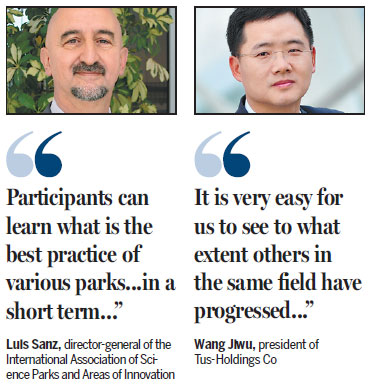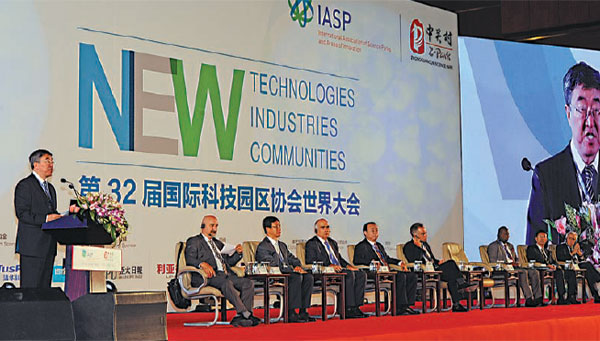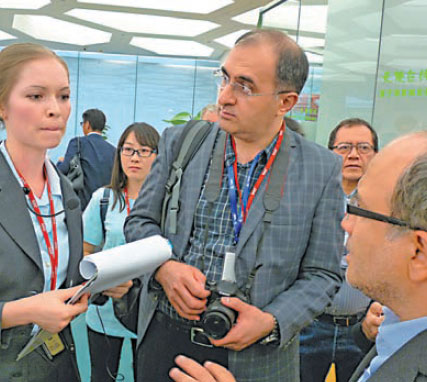Conference offers valuable lessons
|
Deputy Mayor of Beijing Sui Zhenjiang delivers a speech at the opening ceremony of the 32nd IASP World Conference in Beijing on Wednesday. Provided to China Daily |
|
Foreign participants exchange notes with corporate representatives at the Dongsheng Science Park during the IASP World Conference. Zhang Xingjian / For China Daily |

IASP meeting attracts 700 participants from 48 countries to Beijing's Zhongguancun Science Park
The 32nd IASP World Conference in Beijing will offer participants opportunities to learn what is the best practice of various parks from around the world in a short term, Luis Sanz, director general of the International Association of Science Parks and Areas of Innovation, said on Wednesday.
This is the third time that the Zhongguancun Science Park, or Z-Park, a leading innovation center in China, is hosting the global conference.
IASP is the global network of science parks and areas of innovation. This year's conference has attracted nearly 700 representatives from 48 countries and regions.
The four-day event, which started on Tuesday, is a gathering of managers, researchers and entrepreneurs from global science and technology parks.
Guo Hong, director of the administrative committee of the Z-Park, said: "I am convinced this year's conference will spur excellent ideas from all participants and every enterprise will find new opportunities."
He said through the Z-park they could explore key factors for innovative development and share experience of building innovative and entrepreneurial ecosystems with others.
Representatives related to science parks shared their experience of developing such parks and ideas about innovative development shortly after the opening ceremony on Wednesday.
Wang Jiwu, president of Tus-Holdings Co, which runs and develops the Tsinghua Science Park, said he and Tsinghua Science Park have explored and concluded a new concept called clustering innovation.
"We hope to form a networking group and an innovation ecosystem through which science parks and other innovation centers can share resources and cooperate through the Internet and big data technologies," he said.
Wang said that Tus-Holdings Co is practicing the concept and theory of clustering innovation. The company has set up nearly 100 innovation centers including science parks and incubators in China and abroad.
The innovation centers share their development experience via big data and cloud computing technology, said Wang.
He said Tus-Holdings signed a cooperation agreement with a Pakistani university during the conference. The company plans to build a science park in Pakistan, the first one under the Belt and Road Initiative, which refers to the Silk Road Economic Belt and the 21st Century Maritime Silk Road strategies launched by President Xi Jinping in 2013.
He said this year's conference would provide plenty of information insights as leaders from many global science and technology parks and innovation centers are participating.
"It is very easy for us to see to what extent others in the same field have done and what new thoughts they have," Wang said.
Catherine Johns, an executive at Business Durham in the United Kingdom, shared the development experiences of the North East Technology Park that her company runs.
She said the park remained true to its vision and ethos of absolute focus on science-based companies and has articulated its role in the wider economic development agenda.
Maria Adahl and Bjorn Westling from Sweden-based Johanneberg Science Park told the conference how the park is helping solve urbanization problems like noise pollution and carbon dioxide emissions.
The park is developing a project with partners by using advanced technology to attenuate unwanted noise and replace it with pleasant sounds. The project tackles noise problems through absorption instead of isolation and diffusion, the traditional options, they said.
Their park has also helped develop quiet and emission-free electric buses that contribute to a more pleasant urban environment.
Adahl said they want to collaborate much more with participants from different countries and hope those who are interested in their projects would communicate with them during the conference.
The Z-Park had earlier organized the IASP world conference in 1995 and 2005.
Sanz said that over the last few years, the Z-Park has made rapid strides in globalization.
"It means that they not only want to bring companies from other countries to China, but also want Chinese companies to team up with global businesses in overseas markets," he said.
songmengxing@chinadaily.com.cn
(China Daily 09/24/2015 page15)
















